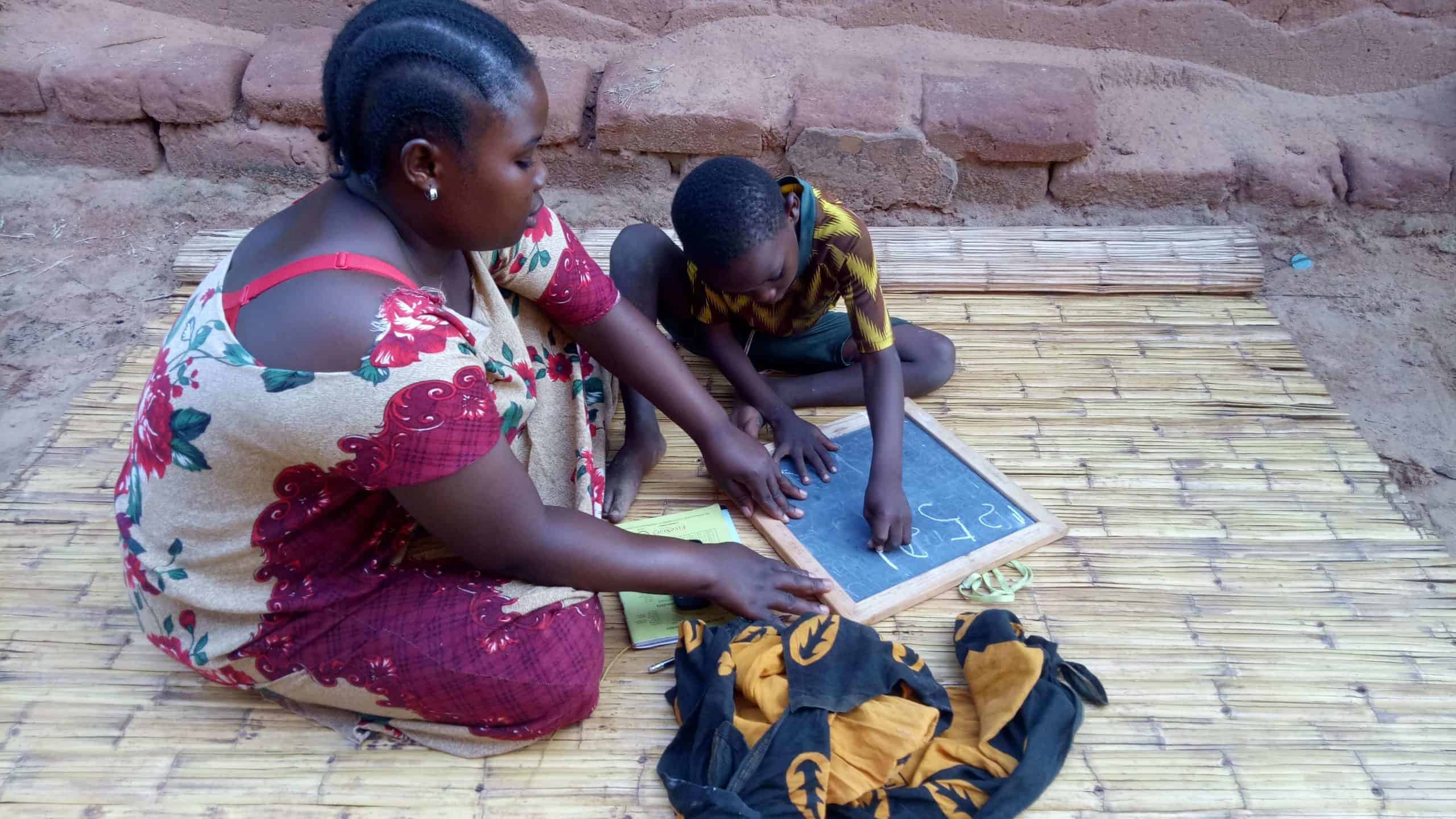Above: Hussein and Swaumu, his mother, working through his lessons
Hussein Abdallah will turn 8 this year, and is now enrolled in Standard 1 class at Luwale Primary School in Lindi, Tanzania. But it was not always certain that Hussein would be able to advance beyond the pre-primary grades at his school since he has had learning difficulties since birth – he was not a fluent speaker, would forget things often and had difficulty concentrating in lessons.
Due to his disability, Hussein had difficulty mastering foundational literacy and numeracy. Indeed, many teachers and others in the community felt that Luwale Primary School was not the appropriate place for him, since it was not a special needs school and lacked the resources and infrastructure needed to deal with Hussein’s particular challenges. His mother, Swaumu, described the community’s perception of her son:
Some of neighbours used to ask me what Hussein was going to do in the school. They believed he was just going to waste time and play with his fellow kids – they did not believe he could learn, since he doesn’t speak well and he is hindered by his disabilities
Swaumu Abdallah
In October 2021, Schools2030 in Tanzania launched a pilot scheme: Kids Supportive Learning at Home. The idea, developed in response to the pandemic,aimed to enhance children’s autonomy in learning at home and initially focused on 50 children from each district – Mtama, Lindi and Temeke – who were struggling to master basic literacy and numeracy skills. The team wanted to encourage parents to be more involved in their children’s learning, since it is widely documented that parental involvement instils greater confidence, interest and educational outcomes for children.
Parents were equipped with mobile phones, exercise books, pencils, crayons, and slates, and a ‘learning at home’ guide was developed by an education consultant that could be accessed freely through mobile phones. Hussein was one of the 50 students enrolled in the initiative and thus his mother was provided with all the necessary material. It is a real testament to her love for her son that she has dedicated every evening after finishing her household chores and farming work to supporting Hussein’s learning. Swaumu acknowledged that it was very difficult initially to get Hussein to concentrate since he just wanted to play, but since he loves drawing, she gave him the crayons to do drawing exercises, and gradually he became more and more interested in the lessons. Now it is he who reminds her to study with him!
Hussein proved so many wrong, and my neighbours are surprised when they find me and him sitting concentrating learning – they wonder how is this possible and they joke with me, calling me a teacher! The guides and resources were very good, giving me what I needed to support Hussein
Swaumu Abdallah
Teachers at Luwale Primary School who had once doubted Hussein’s ability to progress are now pleasantly surprised to see how much he has changed – he can now count, identify letters and seems to be on track to become proficient with basic literacy and numeracy. Moreover, he actually enjoys his lessons, which is a huge success for him as an individual – when young people find the joy in learning, they can truly go so much further. The acting Head Teacher of Luwale, Mr Dickson Mchome commented in early 2022:
If he has demonstrated this ability already, by the time of Standard 1 enrolment Hussein could be one of the students who moves to the next class
By January of 2022, when the Schools2030 team conducted follow-up assessments with teachers of the 50 children enrolled, 23 of them (21 female) had shown significant improvement in their literacy and numeracy skills, so much so that they were enrolled to go onto the next grade. By March of the same year, the figure had risen to 39 students (24 female).
The pilot has proved successful already: not only for creating a more inclusive educational environment and helping children with learning difficulties advanced in their schooling, but also through heightened community awareness about the importance of parental engagement with their children’s education. Parents play a significant role that can make all the difference to a young student, both through lessons at home as well as with instilling a joy for learning in their children. It has also strengthened the relationships between parents and teachers to work more effectively together with a shared interest. Many parents used to think that teachers solely were responsible for their child’s academic progress, but now many see that the whole community – parents, family members and friends alike – can work together to create a better, more supportive and more inclusive learning environment.
